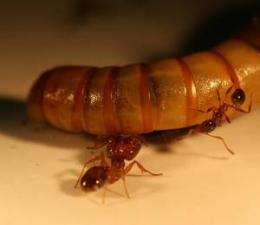Gene Tells Soldier Ants to Beat Swords into Ploughshares

(PhysOrg.com) -- While science has yet to discover what makes that little ol' ant think he'll move that rubber tree plant, researchers at the University of Toronto Mississauga have identified an enzyme in ant brains that determines if they will defend the nest or gather food.
Professor Marla B. Sokolowski, a biologist at the University of Toronto Mississauga who in the 1980s discovered that a single gene affects the foraging behaviour of fruit flies, has found that the ant foraging gene ppfor can change behaviour-causing soldier ants to help with gathering food.
"These findings suggest that evolution has harnessed the same gene-across many different species, including humans-to affect behaviour," says Sokolowski, who holds a Canada Research Chair in Genetics and Behavioral Neurology, and conducted the research with international post-doctoral fellow Christophe Lucas. "We're interested in the mechanism, and that will give rise to helping us understand social behaviour in higher organisms." Lucas is now a researcher at the University of Lausanne in Switzerland.
Pheidole pallidula ants, which nest under stones and soil in southern Europe, North Africa and central Asia, live in colonies with two distinct "subcastes," called majors and minors. Majors, which defend the nest, are almost six times as heavy and 1.5 times as long as minors, and have large heads and mandibles, while the smaller but more numerous minors search for food and retrieve prey.
Lucas and Sokolowski found that changes in the levels of the enzyme cGMP-dependent protein kinase (PKG), made by the ppfor gene, allow majors to switch from defence to foraging behaviour. In times of need, majors help the minors with food gathering by using their mandibles to cut up large prey into manageable pieces. The minors' behaviour is not so flexible; they are not able to switch to defence behaviour.
The study found that the brains of major and minor ants differ in the amount of PKG made by the foraging gene and where it is located. Major ants, which have more PKG, have roughly five more PKG-rich cells on the front surface of their brain than do minor ants. "When we increase the enzyme in majors, either through behavioral manipulation or by changing the amount of it [pharmacologically], majors act as soldiers and defend the nest; when minors give majors a chemical signal to help with food gathering, levels of PKG drop significantly in the majors."
The foraging gene also exists in mice, rats and humans, and Sokolowski and her collaborator Robert Levitan at the Centre for Addiction and Mental Health are currently studying the role that this gene plays in food-related disorders, including Seasonal Affective Disorder (SAD). "We have data to show that individuals with SAD differ in this human version of the foraging gene," says Sokolowski. "It's preliminary data but...there are possibilities for treatment down the line."
The study, which appears in the March 30 issue of the journal Proceedings of the National Academy of Sciences, was funded by grants from the Natural Science and Engineering Council of Canada, the Canada Research Chairs Program, the Fyssen Foundation and a Gene by Environment Canadian Institutes for Health Research training grant.
Provided by University of Toronto Mississauga

















